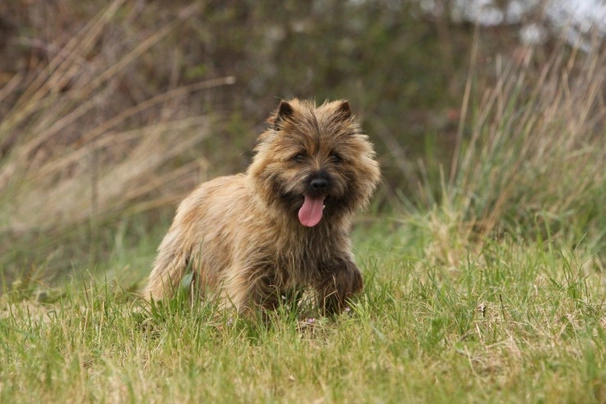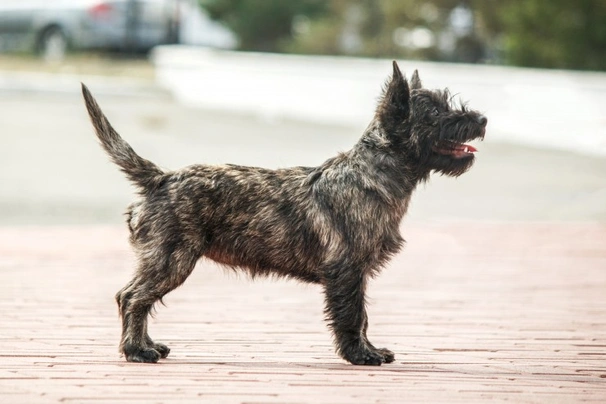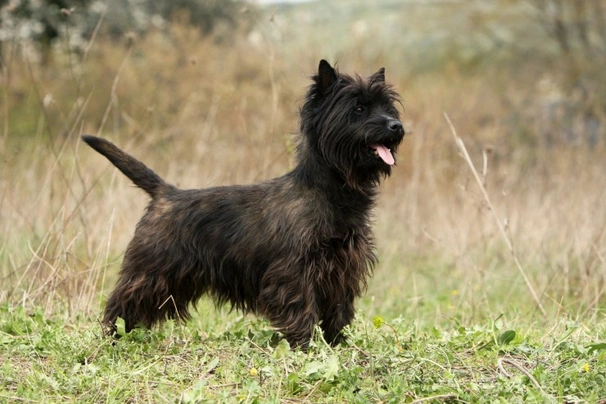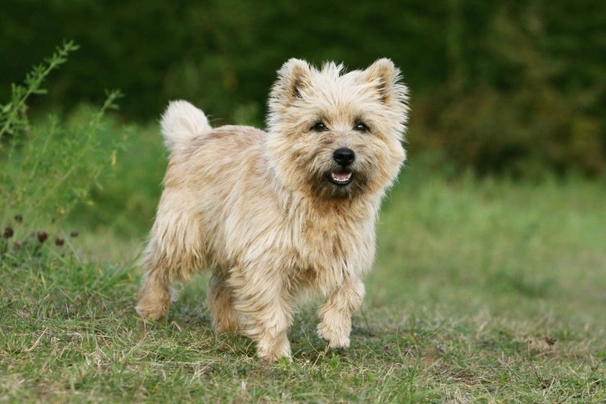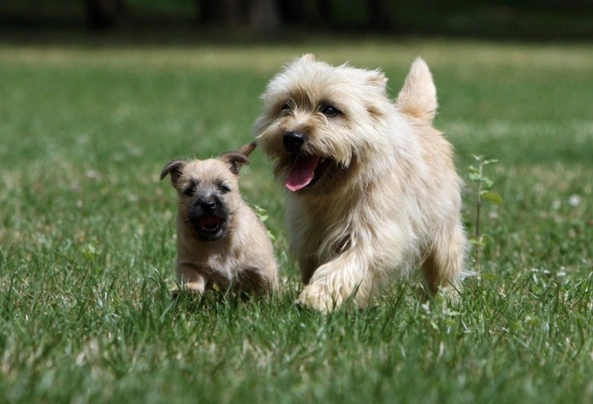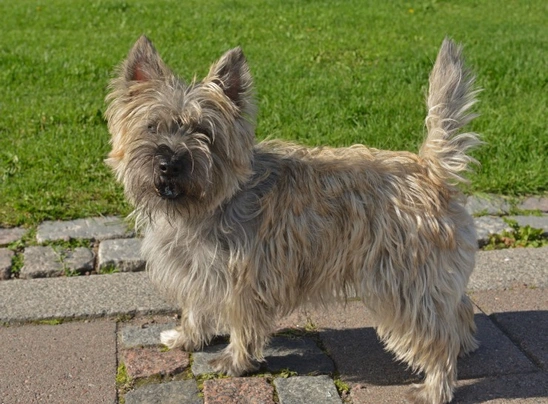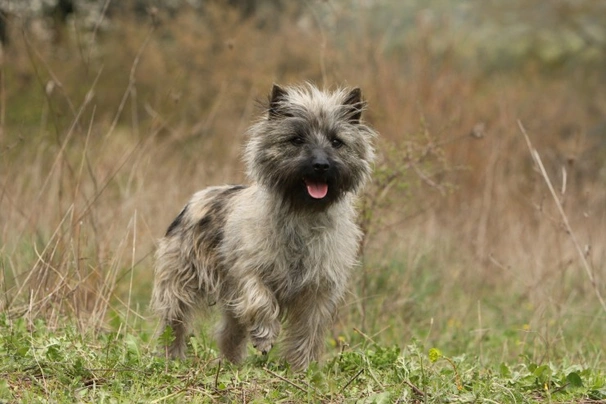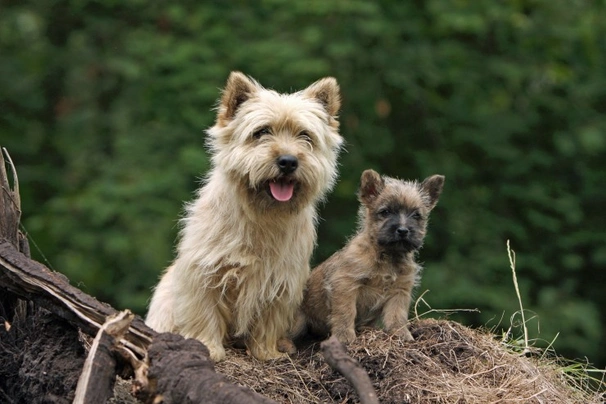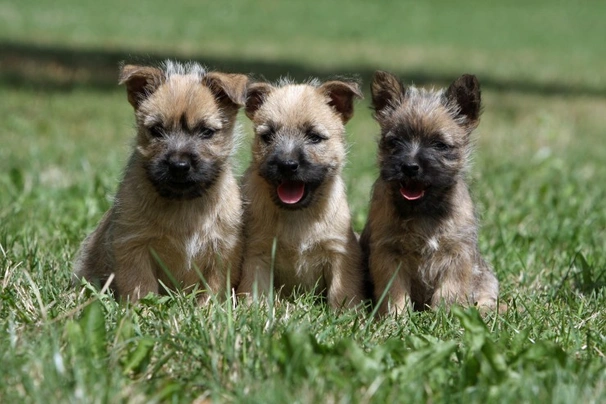Cairn Terrier
Pros
Cons
Introduction of the Cairn Terrier
Cairn Terriers boast a Scottish ancestry and are known for being lively game little dog with a very distinct shaggy coat which is never scruffy looking. At one time they were highly prized for their hunting skills but today these charming dogs are popular both as family pets and companions thanks to their mischievous looks and their devotion to their owners.
Cairn Terriers thrive on being around people and are highly adaptable dogs by nature fitting in comfortably to most lifestyles with the greatest of ease. There is nothing these little dogs like more than to be part of a family and to be involved in everything that goes on in a household. With this said like most terriers the Cairn likes to be kept busy both mentally and physically enjoying nothing more than being out and about doing something. Cairn Terriers also boast having a high prey drive and will happily chase any animal that tries to run away.
History of the Cairn Terrier
Originally bred to hunt vermin foxes and rodents the Cairn Terrier has always been highly prized for their willingness to please. The actual origin of the breed remains unknown but it's thought they are descendants of native working terriers that were used both in the Scottish Highlands and Islands. There are some references to Cairn Terriers that date back to the 16th century when the King of France was sent some "Earth Dogges" by King James I and then later James VI sent some over to the continent too.
Scottish shepherds crofters and hunters would use these terriers to control vermin hunt rabbits and foxes but by the 18th and 19th centuries they were used to hunt badgers and otters because they were considered vermin at the time. These terriers were prized for their courage and "gameness" and they fact they had the ability to ignore any pain when tackling their prey. At the time these terriers varied greatly in colour size and shape from region to region because they were specifically bred to work on different and often challenging terrains and to hunt different types of prey.
Other terriers that were around at the time which included the Scottish Skye and West Highland White were the most recognised breeds during the nineteenth century while the little Cairn remained pretty much unknown other than in the areas of Scotland where they were most commonly bred to hunt. By the 20th century enthusiasts and breeders pushed for the Kennel Club to recognise the Cairn Terrier as a breed but at the time nobody could agree on what to call these dogs. Sometimes they were called "short-coated Skyes" or they were often referred to as "Prick-eared Skyes". One of the most important breed enthusiasts at the time was a lady called Mrs. Campbell who called her Cairns "short-coated Skyes" or "prick-eared Skyes".
It was not until 1910 that the Kennel Club accepted the breed and they were given their name Cairn Terrier. That same year the official Cairn Club was established with just 54 members. Today the Cairn Terrier is known the world over with more than twenty breed clubs worldwide and enthusiasts who do their best to maintain the same breed standard that was so highly prized by the early enthusiasts in times long past and has consistently remained one of the more popular companions and family pets right up until modern times.
Interesting facts about the breed
- Is the Cairn Terrier a vulnerable breed? No they have consistently remained one of the more popular breeds and are ranked 88 out of 238 breeds on the Pets4homes website
- A Cairn Terrier called Royston Crow won Best of Breed at Crufts in 2017
- The terrier in the Wizard of Oz is a Cairn Terrier
- Working breeds have traditionally had their tails docked a practice that has been going on throughout time. The reason a working dog’s tail was docked was to prevent them from being damaged when a dog was flushing out and retrieving game in undergrowth. In 1993 that a law was passed preventing anyone other than a vet from carrying out the procedure but this was further changed when The Animal Health and Welfare Act (Scotland) came into effect in 2006 which invoked a total ban on tail docking unless for medical reasons. In other parts of the UK the Animal Welfare Act came into effect in April 2007 which meant that dog's tails could no longer be docked unless they fell into the category of a specific "working" dog or for medical reasons providing the correct paperwork has been submitted by a qualified vet who would undertake to carry out the procedure. There is a heavy fine for anyone who has a dog’s tail docked without submitting the necessary paperwork to the right authorities
Appearance of the Cairn Terrier
Height at the withers: Males 23 - 33 cm Females 23 - 33 cm
Average weight: Males 4.5 - 6.8 kg Females 4.5 - 6.8 kg
Cairn Terriers are small sturdy and well-muscled little dogs that boast unique looks with their shaggy coats and lovely expressive heads. They have quite a small broad head which are is nicely in proportion with the rest of their body and which boasts a well-defined stop and powerful muzzle. Their heads are well furnished and these little dogs boast a black shiny nose that adds to their overall charming appeal.
Their eyes are set wide apart on their heads and are darkish hazel in colour. Cairn Terriers have shaggy eyebrows which is another physical trait that makes these dogs so endearing. Ears are small and pointed with dogs carrying them upright. These terriers have strong jaws with a regular scissor bite where their upper teeth neatly overlap their lower ones.
Cairn Terriers have strong necks and well boned shoulders. Front legs are straight and covered with coarse hair. Their body is compact with well sprung ribs and dogs have a nice level back and supple well-muscled loins. Hindquarters are well developed with dogs boasting muscular thighs. Back feet are slightly smaller than their front ones but both front and back have thick strong pads. Cairn Terriers have short well-furnished tails which they carry gaily but never holding them over their backs.
When it comes to their coat the Cairn Terrier boasts a very weather-resistant double coat which is especially important for the breed. The outer coat being rough but never coarse. Their undercoat is softer short and it lies close to a dog's body. A Cairn Terrier can have a slight wave in their coat which is permissible. These little terriers come in a variety of colours which includes the following:
- Brindle
- Cream
- Cream Brindle
- Dark Brindle
- Dark Red Brindle
- Dark Wheaten
- Grey
- Grey Black
- Grey Black Brindle
- Grey Brindle
- Light Red
- Red
- Red Brindle
- Red Wheaten
- Silver Brindle
- Wheaten
- Wheaten Brindle
Dogs can have a little brindle in their coats and they often have darker points on their muzzles and ears which is also acceptable as a breed standard. It is also worth noting that a Cairn Terrier's coat often changes colour during their lifetimes.
Gait/movement
When a Cairn Terrier moves they do so with a nice free-flowing movement with their front lets reaching forward as they do. They have a lot of propulsion in their hindquarters and a dog's hocks should neither be too close together or too far apart.
Faults
The Kennel Club frowns on any exaggerations or departures from the breed standard and would judge the faults on how much they affect a dog's overall health and wellbeing as well as their ability to perform.
Males should have both testicles fully descended into their scrotums and it is worth noting that a dog can be a little lighter or heavier as well as slightly taller or shorter than set out in the Kennel Club breed standard which is given as a guideline only.
Temperament of the Cairn Terrier
The Cairn Terrier is known to be a very "game" little dog that boasts a happy yet fearless disposition. They rarely show any aggression and they are very confident characters. Like many of their terrier cousins they are intelligent dogs which makes them easy to train when handled correctly. However they are extremely quick off the mark which means they are masters when it comes to getting into a bit mischief without an owner ever catching then in the act a trait these terriers are renowned for.
With this said a Cairn Terrier's training and education needs to start early and it's a good idea to enrol them into obedience classes as soon as they have had all their vaccinations. These little dogs love taking part in all sorts of canine sporting activities and excel at many of them. The thing to bear in mind is that it is never a good idea to get a young Cairn Terrier jumping up because they could end up damaging their backs their joints and ligaments when they do and this could make life very uncomfortable later in their adult life.
They are a great choice for first time owners but only if they have enough time to spend with their dogs. Cairn Terriers thrive on being around people and do not do well when left to their own devices for long periods of time. They would not be a good choice for people who spend most the day out of the house leaving their pets alone in the home. This could lead to a Cairn Terrier developing some behavioural issues which includes them suffering from separation anxiety. It may well lead to a Cairn being destructive around the home and they may even injure themselves.
With this said the Cairn Terrier is a brilliant choice for people who work from home and families who spend all their free time in the great outdoors with their canine companion in tow. These little terriers also like to be able to roam around a garden bearing in mind that like a lot of other terriers the fencing must be extremely secure because these little dogs are highly skilled at finding any weaknesses in a fence and will escape if they find they can.
Are they a good choice for first time owners?
Cairn Terriers are a good choice for first time dog owners providing they have the time to dedicate to an intelligent active canine companion who thrives on human company. They are particularly good around children and older people although playtime can be a bit boisterous at times.
What about prey drive?
The Cairn Terrier is a "terrier" and therefore boasts a very high prey drive and will happily chase anything that moves. With this said if they grow up with a family cat in the home they generally get on well together but this is not to say a Cairn Terrier would not chase the cat from next door whenever they get the chance to. As such care should always be taken as to where a Cairn can run free off the lead and extra care must be taken when they meet any animal or pet they have never met before.
What about playfulness?
Cairn Terriers have a very playful and mischievous side to their natures and love to entertain and be entertained. They are renowned for testing the "limits" just for the fun of it and to see how much they can get away with. They adore playing interactive games with the kids and are particularly gentle when they do although a Cairn will run off with the ball or toy and not want to give it back when the mood takes them.
What about adaptability?
Cairn Terriers are highly adaptable dogs and providing they are given enough daily physical exercise combined with as much mental stimulation as possible to prevent boredom from setting in they are just as happy living in an apartment in town as they are living in a house in the country. However like many other terriers and dogs Cairns love to be able to roam around a secure back garden whenever they can so they can really let of steam.
What about separation anxiety?
Cairn Terriers form strong ties with their families and dogs are never very happy when they find themselves left on their own for longer periods of time. They are better suited to people who either work from home or in households where one person stays at home when everyone else is out so they are never alone for any length of time which could see a dog suffering from separation anxiety. This can lead to them being destructive around the home which is a dog's way of relieving any stress they are feeling and a way to keep themselves entertained which includes barking incessantly to get attention.
What about excessive barking?
Cairn Terriers are known to like the sound of their own voices a little too much which is something that needs to be gently nipped in the bud when a dog is still young being careful not to frighten them. However there is never any guarantee that a Cairn would not continue to bark for the sake of it and when they think they have cornered their prey somewhere in a back garden.
Do Cairn Terriers like water?
Most Cairns enjoy swimming and will take to the water whenever they can more especially when the weather is hot. However if anyone who owns a dog that does not like water should never force them to go in because it would just end up scaring them. With this said care should always be taken when walking a Cairn Terrier off the lead anywhere near more dangerous watercourses just in case a dog decides to leap in and then needs rescuing because they cannot get out of the water on their own.
Are Cairn Terriers good watchdogs?
Cairn Terrier make for very good watchdogs and are always quick off the mark to let an owner know when there are strangers about or when something they don't like is going on in their environment. The problem is that a lot of Cairns bark for the sake of it which means it can be hard for an owner to know when there is something wrong or when strangers are about and when there is not.
Intelligence / Trainability of the Cairn Terrier
Although intelligent little dogs the Cairn Terrier can be stubborn at times thanks to their quite independent natures. Their training needs to start as early as possible and they need to be handled with a firm yet gentle hand from a young age so they learn all the ground rules. Once a puppy has been fully vaccinated it's a good idea to enrol them into an obedience class which would pay dividends later with the added bonus being that Cairn Terriers really enjoy taking part in these classes.
Because Cairn Terrier puppies are incredibly cute it is all too easy to spoil them when they first arrive in their new homes. However new owners need to start out as they mean to go on which means setting out ground rules and teaching a puppy what is acceptable behaviour and what is not. All dogs are much better behaved when they know what their owners expect of them and who is the alpha dog in a household. As such the first commands a Cairn Terrier should be taught right from the word go are as follows:
- Come
- Sit
- Stay
- Quiet
- Leave it
- Down
- Bed
Children and other
The Cairn Terrier is a great choice as a family pet because they seem to have an affinity with children and love nothing more than to be around them. However whenever children and dogs get together it’s best for it to happen when there is an adult around just in case things get too boisterous and out of hand.
Generally they are good around other pets but being terriers they should not be left alone with small pets and this includes cats. With this said it pays for Cairn Terriers to be introduced to any pets and other animals they will be sharing a home with from an early age and care should be taken whenever they meet any other small animals and pets.
Health of the Cairn Terrier
The average life expectancy of a Cairn Terrier is between 12 and 17 years when properly cared for and fed an appropriate good quality diet to suit their ages.
Cairn Terriers are known to be healthy and robust little dogs but like so many other pure breeds they are prone to suffer from certain hereditary health issues which are worth knowing about if you are hoping to share your home with one of these energetic little terriers. The health issues that seem to most affect the breed include the following:
- Cataracts
- Progressive retinal atrophy
- Lens luxation
- Retinal Dysplasia (RD) - less frequently seen in the breed
- Persistent Pupillary Membrane (PPM) - less frequently seen in the breed
- Persistent Hyaloid Artery (PHA) - less frequently seen in the breed
- Entropion - less frequently seen in the breed
- Glaucoma - including Acute Glaucoma - less frequently seen in the breed - dogs with the condition should be spayed or neutered
- Optic nerve hypoplasia
- Porto systemic shunt (PSS) - often referred to as liver shunt - dogs with the condition should be spayed or neutered
- Ocular melanosis (OM)
- Abnormal Pigmentation (APD)
- Hip Dysplasia - hip scoring available through the Animal Health Trust (AHT)
- Luxating Patella
- Von Willebrand Disease
- Legg-Calves-Perthes disease
More about Optic Nerve Hypoplasia
Fortunately optic nerve hypoplasia is an eye disorder that is less frequently seen in Cairn Terriers. The problem is due to a dog's optic nerve being malformed at birth hence the condition is congenital. Either one eye can be affected or both which makes it a unilateral or bilateral condition. When only one eye is affected a Cairn Terrier's vision will not be too badly affected. However if the condition affects both of a dog's eyes they typically lose their sight. Any Cairn Terrier suffering from optic nerve hypoplasia should be spayed or neutered and not used for breeding purposes.
What about vaccinations?
Cairn Terrier puppies would have been given their initial vaccinations before being sold but it is up to their new owners to make sure they have their follow-up shots in a timely manner with the vaccination schedule for puppies being as follows:
10 -12 weeks old bearing in mind that a puppy would not have full protection straight away but would be fully protected 2 weeks after they have had their second vaccination
There has been a lot of discussion about the need for dogs to have boosters. As such it's best to talk to a vet before making a final decision on whether a dog should continue to have annual vaccinations which are known as boosters.
What about spaying and neutering?
A lot of vets these days recommend waiting until dogs are slightly older before spaying and neutering them which means they are more mature before undergoing the procedures. As such they advise neutering males and spaying females when they are between the ages of 6 to 9 months old and sometimes even when a dog is 12 months old.
Other vets recommend spaying and neutering dogs when they are 6 months old but never any earlier unless for medical reasons. With this said many breeds are different and it is always advisable to discuss things with a vet and then follow their advice on when a dog should be spayed or neutered.
What about obesity problems?
Some Cairn Terriers gain weight after they have been spayed or neutered and it's important to keep an eye on a dog's waistline just in case they do. If a dog starts to put on weight it's important to adjust their daily calorie intake and to up the amount of exercise they are given. Older dogs too are more prone to gaining weight and again it's essential they be fed and exercised accordingly because obesity can shorten a dog's life by several years. The reason being that it puts a lot of extra strain on a dog's internal organs including the heart which can prove fatal.
What about allergies?
Some Cairn Terriers are prone to suffering from allergies and it's important for a dog to see a vet sooner rather than later if one flares up. Allergies can be notoriously hard to clear up and finding the triggers can be challenging. With this said a vet would be able to make a dog with an allergy more comfortable while they try to find out the triggers which could include the following:
- Certain foods especially dog food that contains high levels of grain or other type of cereal filler
- Airborne pollens
- Dust mites
- Environment
- Flea and tick bites
- Chemicals found in everyday household cleaning products
Participating in health schemes
All responsible Cairn Terrier breeders would ensure that their stud dogs are tested for known hereditary and congenital health issues known to affect the breed by using the following schemes:
- BVA/KC/ISDS Eye Scheme
- Bile acid testing for puppies
- Hip scoring through the Animal Health Trust
What about breed specific breeding restrictions?
Apart from the standard breeding restrictions set out by the Kennel Club for all registered breeds there are no other breed specific breeding restrictions in place for the Cairn Terrier.
What about Assured Breeder Requirements?
The Kennel Club strongly recommends that all Cairn Terrier breeders use the schemes available before using a dog in a breeding programme:
Caring for the Cairn Terrier
As with any other breed Cairn Terriers need to be groomed on a regular basis to make sure their coats and skin are kept in top condition. They also need to be given regular daily exercise to ensure they remain fit and healthy. On top of this they need to be fed good quality food that meets all their nutritional needs throughout their lives.
Caring for a Cairn Terrier puppy
Cairn Terrier puppies are boisterous and full of life which means it's essential for homes and gardens to be puppy-proofed well in advance of their arrival. A responsible breeder would have well socialised their puppies which always leads to more outgoing confident and friendly dogs right from the word go. With this said any puppy is going to feel vulnerable when they leave their mother and littermates which must be taken into account. The longer a puppy can remain with their mother the better although it should never be for too long either.
It's best to pick a puppy up when people are going to be around for the first week or so which is the time needed for a puppy to settle in. Puppy-proofing the home and garden means putting away any tools and other implements that a boisterous puppy might injure themselves on. Electric wires and cables must be put out of their reach because puppies love chewing on things. Toxic plants should be removed from flowerbeds and the home too.
Puppies need to sleep a lot to grow and develop as they should which means setting up a quiet area that's not too out of the way means they can retreat to it when they want to nap and it's important not to disturb them when they are sleeping. It's also a good idea to keep "playtime" nice and calm inside the house and to have a more active "playtime" outside in the garden which means puppies quickly learn to be less boisterous when they are inside.
The documentation a breeder provides for a puppy must have all the details of their worming date and the product used as well as the information relating to their microchip. It is essential for puppies to be wormed again keeping to a schedule which is as follows:
- Puppies should be wormed at 6 months old
- They need to be wormed again when they are 8 months old
- Puppies should be wormed when they are 10 months old
- They need to be wormed when they are 12 months old
Things you'll need for your puppy
There are certain items that new owners need to already have in the home prior to bringing a new puppy home. It's often a good idea to restrict how much space a puppy plays in more especially when you can't keep an eye on what they get up to bearing in mind that puppies are often quite boisterous which means investing in puppy gates or a large enough playpen that allows a Cairn puppy the room to express themselves while keeping them safe too. The items needed are therefore as follows:
- Good quality puppy or baby gates to fit on doors
- A good well-made playpen that's large enough for a puppy to play in so they can really express themselves as puppies like to do
- Lots of well-made toys which must include good quality chews suitable for puppies to gnaw on bearing in mind that a puppy will start teething anything from when they are 3 to 8 months old
- Good quality feed and water bowls which ideally should be ceramic rather than plastic or metal
- A grooming glove
- A slicker brush or soft bristle brush
- Dog specific toothpaste and a toothbrush
- Scissors with rounded ends
- Nail clippers
- Puppy shampoo and conditioner which must be specifically formulated for use on dogs
- A well-made dog collar or harness
- A couple of strong dog leads
- A well-made dog bed that's not too small or too big
- A well-made dog crate for use in the car and in the home that's large enough for a puppy to move around in
- Baby blankets to put in your puppy's crate and in their beds for when they want to nap or go to sleep at night
Keeping the noise down
All puppies are sensitive to noise including Cairn Terrier puppies. It's important to keep the noise levels down when a new puppy arrives in the home. TVs and music should not be played too loud which could end up stressing a small puppy out.
Keeping vet appointments
As previously mentioned Cairn Terrier puppies would have been given their first vaccinations by the breeders but they must have their follow up shots which is up to their new owners to organise. The vaccination schedule for puppies is as follows:
- 10 -12 weeks old bearing in mind that a puppy would not have full protection straight away but would only be fully protected 2 weeks after they have had their second vaccination
When it comes to boosters it's best to discuss these with a vet because there is a lot of debate about whether a dog really needs them after a certain time. However if a dog ever needed to go into kennels their vaccinations would need to be
What about older Cairn Terriers when they reach their senior years?
Older Cairn Terriers need lots of special care because as they reach their golden years they are more at risk of developing certain health concerns. Physically a dog's muzzle may start to go grey but there will be other noticeable changes too which includes the following:
- Coats become coarser
- A loss of muscle tone
- Cairn Terriers can either become overweight or underweight
- They have reduced strength and stamina
- Older dogs have difficulty regulating their body temperature
- They often develop arthritis
- Immune systems do not work as efficiently as they once did which means dogs are more susceptible to infections
- Older dogs change mentally too which means their response time tends to be slower as such they develop the following:
- They respond less to external stimuli due to impaired vision or hearing
- They tend to be a little pickier about their food
- They have a lower pain threshold
- Become intolerant of any change
- Often an older dog can feel disorientated
Living with a Cairn Terrier in their golden years means taking on a few more responsibilities but these are easily managed and should include looking at their diet the amount of exercise they are given how often their dog beds need changing and keeping an eye on the condition of their teeth.
Older Cairn Terriers need to be fed a good quality diet that meets their needs at this stage of their lives all the while keeping a close eye on a dog's weight. A rough feeding guide for older dogs is as follows bearing in mind they should be fed highly digestible food that does not contain any additives:
- Protein content should be anything from 14 – 21%
- Fat content should be less than 10%
- Fibre content should be less than 4%
- Calcium content should be 0.5 – 0.8%
- Phosphorous content should be 0.4 – 0.7%
- Sodium content should be 0.2 – 0.4%
Older Cairns don't need to be given the same amount of daily exercise as a younger dog but they still need the right amount of physical activity to maintain muscle tone and to prevent a dog from putting on too much weight. All dogs need access to fresh clean water and this is especially true of older dogs when they reach their golden years because they are more at risk of developing kidney disorders.
Grooming of the Cairn Terrier
Cairn Terriers need to be given a quick brush over every day to keep their coats tangle-free and this is especially true during the winter when they get a little muddier. Their coat is quite harsh although not too coarse so it pays to take them along to a professional groomer to have it hand stripped at least 2 to 3 times a year. Like other breeds the Cairn Terrier tends to shed more during the Spring and then again in the Autumn which is when more frequent brushing would be necessary to keep on top of things.
It's also a good idea to check a Cairn’s ears on a regular basis to ensure no dirt or debris has got lodged in them which could lead to an infection taking hold. This type of infection can be notoriously hard to treat once it flares up.
Exercise of the Cairn Terrier
Cairn Terriers are high-energy characters and they like to be kept busy both physically and mentally bearing in mind that many of them have very low boredom thresholds. Ideally they need to be given at minimum of one hour's vigorous exercise every day and they live in a house that boasts a very secure garden these terriers like nothing more than to spend time outside letting off steam as often as possible during the day. It is worth noting that Cairns are notorious for digging up lawns and flower beds just for the fun of it.
It's important to keep these terriers mentally stimulated as a way of preventing boredom from setting in which could lead to a dog finding their own ways of amusing themselves. This is often manifested in some unwanted behaviours which includes digging and being destructive around the home.
Feeding of the Cairn Terrier
If you get a Cairn Terrier puppy from a breeder they would give you a feeding schedule and it's important to stick to the same routine feeding the same puppy food to avoid any tummy upsets. You can change a puppy's diet but this needs to be done very gradually always making sure they don't develop any digestive upsets and if they do it's best to put them back on their original diet and to discuss things with the vet before attempting to change it again.
Older dogs are not known to be fussy or finicky eaters but this does not mean you can feed them a lower quality diet. It's best to feed a mature Cairn Terrier twice a day once in the morning and then again in the evening making sure it's good quality food that meets all their nutritional requirements. It's also important that dogs be given the right amount of exercise so they burn off any excess calories or they might gain too much weight which can lead to all sorts of health issues. Obesity can shorten a dog's life by several years so it's important to keep an eye on their waistline from the word go.
Feeding guide for a Cairn Terrier puppy
Puppies need to be fed a highly nutritious good quality diet for them to develop and grow as they should. As a rough guide a Cairn Terrier puppy can be fed the following amounts every day making sure their meals are evenly spread out throughout the day and it's best to feed them 3 or 4 times a day:
- 2 months old - 96g to 102g depending on puppy's build
- 3 months old - 108g to 118g depending on puppy's build
- 4 months old - 110g to 124g depending on puppy's build
- 5 months old - 110g to 125g depending on puppy's build
- 6 months old - 94g to 124g depending on puppy's build
- 7 months old - 80g to 112g depending on puppy's build
- 8 months old - 78g to 100g depending on puppy's build
- 9 months old - 78g to 89g depending on puppy's build
- 10 months old - 78g to 88g depending on puppy's build
Once a puppy is 11 months old they can be fed adult dog food.
Feeding guide for an adult Cairn Terrier
Once fully mature an adult Cairn Terrier must be fed a good quality diet to ensure their continued good health. As a rough guide an adult Cairn Terrier can be fed the following amounts every day:
- Dogs weighing 4.5 kg can be fed 75g to 85g depending on activity
- Dogs weighing 5.5 kg can be fed 86g to 99g depending on activity
- Dogs weighing 6.5 kg can be fed 97g to 113g depending on activity
Cairn Terrier price
If you are looking to buy a Cairn Terrier you would need to pay anything from £400 to over £500 for a well-bred pedigree puppy. The cost of insuring a male 3-year-old Cairn Terrier in northern England would be £18.32 a month for basic cover but for a lifetime policy this would set you back £41.78 a month (quote as of November 2017). When insurance companies calculate a pet's premium they factor in several things which includes where you live in the UK and a dog's age and whether they have been neutered or spayed.
When it comes to food costs you need to buy the best quality food whether wet or dry to feed your dog throughout their lives making sure it suits the different stages of their lives. This would set you back between £35 - £50 a month. On top of this you would need to factor in veterinary costs if you want to share your home with a Cairn Terrier and this includes their initial vaccinations their annual boosters the cost of neutering or spaying your dog when the time is right and their yearly health checks all of which quickly adds up to over a £1000 a year.
As a rough guide the average cost to keep and care for a Cairn Terrier would be between £65 to £100 a month depending on the level of insurance cover you opt to buy for your dog but this does not include the initial cost of buying a well-bred healthy Kennel Club registered pedigree Cairn Terrier puppy.
Buying advice
When visiting and buying any puppy or dog there are many important things to consider and questions to ask of the breeder/seller. You can read our generic puppy/dog advice here which includes making sure you see the puppy with its mother and to verify that the dog has been wormed and microchipped.
Cairn Terriers have consistently remained a popular breed both in the UK and elsewhere in the world which means that well-bred healthy puppies can command a lot of money. As such with Cairn Terriers there is specific advice questions and protocols to follow when buying a puppy which are as follows:
- Beware of online scams and how to avoid them. You may see online and other adverts by scammers showing images of beautiful Cairn Terrier puppies for sale at very low prices. However the sellers ask buyers for money up front before agreeing to deliver a puppy to a new home. Potential buyers should never buy a puppy unseen and should never pay a deposit or any other money online to a seller. You should always visit the pet at the sellers home to confirm they are genuine and make a note of their address.
- As previously touched upon Cairn Terrier are among the more popular breeds in the UK. As such there are many amateur breeders/people who breed from dam far too often so they can make a quick profit without caring for the welfare of the puppies their dam or the breed in general. Under Kennel Club rules a dam can only produce 4 litters and she must be between a certain age to do so. Anyone wishing to buy a Cairn Terrier puppy should think very carefully about who they purchase their puppy from and should always ask to see the relevant paperwork pertaining to a puppy's lineage their vaccinations and their microchipping.
- Prospective owners should be very careful when buying a Cairn Terrier with a docked tail which is now against the law and which carries a heavy fine if the procedure was carried out without permission from the right authorities.

KC reg pups off HEALTH TESTED PARENTS avail April
£1,800
KC Registered Cairn Terrier Puppies Family Raised
£1,750
